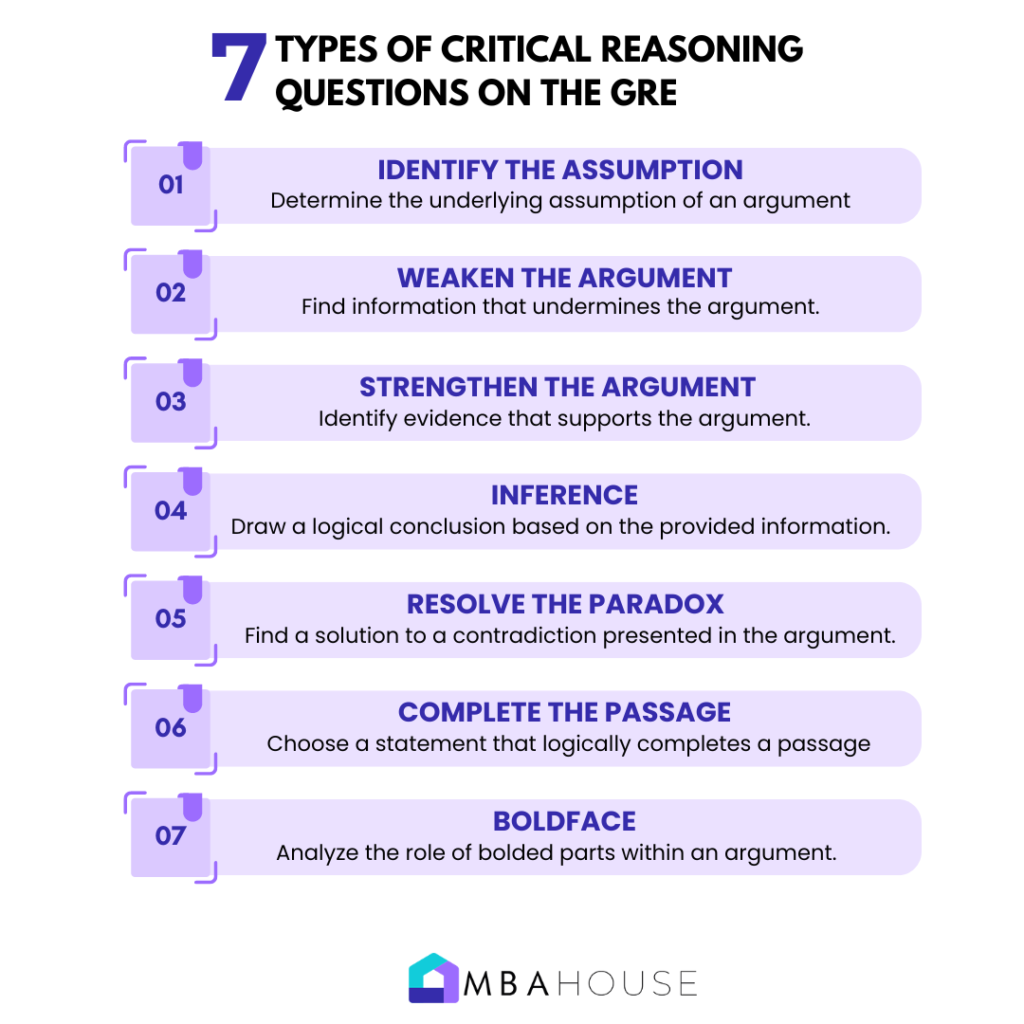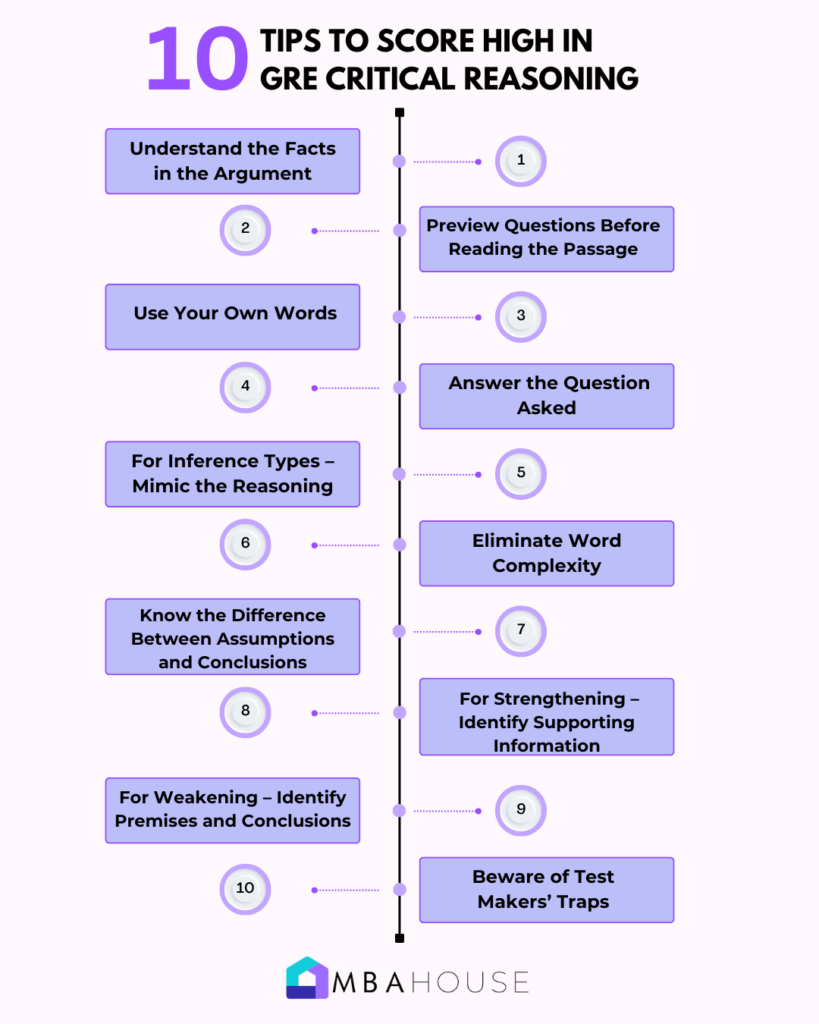The Critical Reasoning section of the GRE is your chance to show off how well you can think on your feet. Imagine this: you’re given a statement or argument, and with a few key strategies, you can confidently break it down, analyze it, and draw meaningful conclusions.
Sound challenging? It’s not as tough as it seems when you know what to expect and how to approach it.
So, let’s keep it simple—What is Critical Reasoning in the GRE? At its core, it’s about logical thinking. Whether you’re asked to strengthen an argument, identify an assumption, or draw an inference, this section tests how well you can evaluate information and form an informed judgment. And here’s the good news: you’ve likely already done this kind of reasoning in your daily life. Have you ever watched a movie and predicted the ending based on a few subtle clues? That’s critical reasoning in action!
But how do you pass a Critical Reasoning test with confidence? The key is to familiarize yourself with the question types—like strengthening or weakening an argument—and then practice applying logical thinking to each one. With the right strategies and enough practice, you’ll find these questions become much more approachable.
If you’re gearing up for the exam and looking for some last-minute tips, check out 20+ Practical Last-Minute GRE Study ideas to give your preparation that final boost.
In this blog, we’ll dive deep into the best ways to approach Critical Reasoning, offering practical tips and examples to help you ace this section. Let’s get started and make this part of the GRE your strength!
What Are Critical Thinking Reasoning Questions on the GRE?
When tackling critical thinking reasoning questions on the GRE, you’ll face different question types that test your ability to analyze, evaluate, and interpret arguments logically. While these questions may seem challenging at first, they follow consistent patterns.
Let’s break down the key types of Critical Reasoning questions you’ll likely encounter.

1. Identify the Assumption
In these questions, you’re asked to find the hidden assumption that the argument relies on. An assumption is something that is not explicitly stated but is essential for the argument to hold. Think of it as the invisible bridge between the evidence provided and the conclusion drawn.
2. Weaken the Argument
Here, your job is to find a piece of information that would weaken or challenge the argument. It could be a fact or an observation that casts doubt on the logic of the argument, potentially unraveling its entire conclusion.
3. Strengthen the Argument
In contrast to weakening the argument, these questions ask you to identify a statement that would bolster the argument’s conclusion. Your goal is to find evidence or reasoning that adds weight to the argument, making it more convincing.
4. Resolve a Paradox
These questions present you with a situation that seems contradictory. Your task is to find a statement or explanation that resolves the apparent inconsistency, making sense of the paradox.
5. Inference
Inference questions test your ability to draw logical conclusions based on the information provided. You’re not looking for what might be true, but for what must be true given the facts at hand.
6. Complete the Passage
In these questions, you’re asked to choose the most logical statement to finish a sentence or thought at the end of a passage. This requires understanding the flow of the argument and predicting how it should conclude.
7. Method of Reasoning
This type of question focuses on how an argument is structured. You’ll need to identify the method or strategy the author uses to develop their argument, rather than focusing solely on the content.
8. Boldface
Boldface questions present two bolded portions of text, and you’re asked to determine the role each one plays in the argument. Does the bold text serve as evidence, a conclusion, or something else entirely? Understanding how these parts work together is key to answering these questions.
Practice Makes Perfect
The key to mastering these types of questions is practice, practice, practice!!!
Working through GRE logic questions sample exercises will give you the familiarity and confidence to recognize patterns and apply the right strategy. The more you expose yourself to these different question types, the better you’ll become at spotting the right answers quickly and efficiently.
Sample Critical Thinking Reasoning Questions for the GRE
Question #1: Sample Critical Reasoning
Question: Over the past year, brown bears that inhabit the nearby mountains have been coming into the Town of Silverton with greater regularity than ever before. About a year ago, three farms in the town began producing honey, which brown bears find irresistible. Therefore, it must be that the reason why brown bears are coming into the town with greater regularity is that they are coming to consume the honey produced by these farms.
Which of the following, if true, most seriously weakens the argument?
- One year ago, several farms in the town began growing blueberries, another favorite food of brown bears.
- The town’s residents have grown increasingly anxious about the increased presence of the brown bears.
- Over the past year, the number of mountain lions sighted in the town has remained the same as in previous years.
- The owners of the honeybee farms have reported seeing brown bears raiding their beehives for honey.
- Brown bears are drawn to honey because it’s rich in sugar and calories, which they need to maintain their weight.
Question #2: Sample Critical Reasoning
Question: Last week, the Silver Bullet Tea Company, which recently opened a chain of high-end tea shops in the affluent City of Silverton, launched a marketing campaign involving television, newspaper, and internet ads, aimed at letting residents know its tea shops are open. Therefore, it’s expected that Silverton’s tea shops will soon be filled with residents purchasing tea.
Which of the following, if true, most weakens the argument above?
- In Silverton, local laws only allow tea shops to operate under strict ordinances.
- The Silver Bullet Tea Company spent less than half of its original marketing budget for the City of Silverton.
- Most residents of Silverton are willing to purchase high-end tea.
- Residents of Silverton, who are outdoorsy, rarely watch TV, read newspapers, or use the internet.
- In a recent survey, many residents expressed a desire for more high-end tea and coffee shops.
10 Tips and Strategies to Score Well in GRE Critical Reasoning

How do you pass a Critical Reasoning test?
Here are some key strategies to keep in mind while tackling the Critical Reasoning section on the GRE.
1. Understand the Facts in the Argument
Begin by identifying the premise and the conclusion of the argument. What is stated versus what is implied? Often, arguments include statistical figures and surveys that may not represent the general population. By clarifying these elements, you’ll have a solid foundation for analyzing the argument.
2. Preview Questions Before Reading the Passage
Instead of speed reading, actively engage with the passage. Skim the text first to get a general idea and then read more carefully with the questions in mind. This approach saves time and helps you focus on key details that are crucial for answering the questions.
3. Use Your Own Words
Simplify the passage’s main ideas by paraphrasing in your own words. If you can explain the argument as if to a younger audience, you’ll better grasp its essence and choose the most logical answer.
4. Answer the Question Asked
Pay close attention to what the question is specifically asking. Avoid letting personal opinions or assumptions sway your choice. Ensuring you fully understand the question will help you select the most accurate answer.
5. For Inference Types – Mimic the Reasoning
Try to follow the same line of reasoning as the passage. The correct answer often mirrors the structure and length of the argument. Look for options that restate or support the conclusion in a similar format.
6. Eliminate Word Complexity
Simplify the problem by focusing on straightforward answers. Avoid choices that are overly complex or extreme. The simplest solution is often the correct one.
7. Know the Difference Between Assumptions and Conclusions
Assumptions are unstated premises, while conclusions are the author’s hypotheses. For assumption questions, check if the conclusion holds true when you negate the assumption. For conclusion questions, find options that test the hypothesis with “IF A then not B” scenarios.
8. For Strengthening – Identify Supporting Information
Look for answers that add supporting evidence to the argument. Strengthening questions often require you to connect new information to the existing evidence and conclusion.
9. For Weakening – Identify Premises and Conclusions
In weakening questions, assume the answer choice is true and see if it exposes flaws in the argument. Look for gaps or errors between the scenarios presented and the premises.
10. Beware of Test Makers’ Traps
Test creators may try to mislead you with incorrect conclusions or tricky wording. Stay alert for such traps to avoid making errors based on misleading information.
Bringing It All Together
“Success is the sum of small efforts, repeated day in and day out.” — Robert J. Collier
As you gear up for the GRE, remember: don’t stress out, and take care of your health. Consistent practice and a focused mindset are your best allies in mastering the Critical Reasoning section. By understanding the types of questions and applying the strategies we’ve discussed, you’ll be well-prepared to tackle this challenging part of the test.
If you’re searching for trusted GRE study courses, MBA House is here to support you. Our team of Ivy League-trained tutors and consultants is dedicated to guiding you through every step of your GRE preparation.
Your Questions Answered: GRE Critical Reasoning Section
Does the GRE have logical reasoning questions?
The GRE doesn’t feature traditional logical reasoning questions, but it does include GRE logic questions within its reading comprehension sections. These questions require you to make inferences based on the passage’s information. To succeed, focus on understanding and analyzing the text carefully, as logical reasoning is crucial for drawing accurate conclusions.
How many questions can you get wrong on the GRE for 170?
To achieve a perfect score of 170 on the GRE, the number of questions you can get wrong varies between sections. For the Quantitative section, you can typically only afford to miss 1-2 questions to score a 170. In contrast, for the Verbal section, you can get about 3-6 questions wrong and still achieve a perfect score. It’s important to note that exact thresholds can vary based on the difficulty of the test and overall test-taker performance.
How many critical reasoning questions are in the GRE?
The GRE Critical Reasoning section features seven types of questions:
- Identify the Assumption
- Weaken the Argument
- Strengthen the Argument
- Inference
- Resolve the Paradox
- Complete the Passage
- Boldface





Social Media